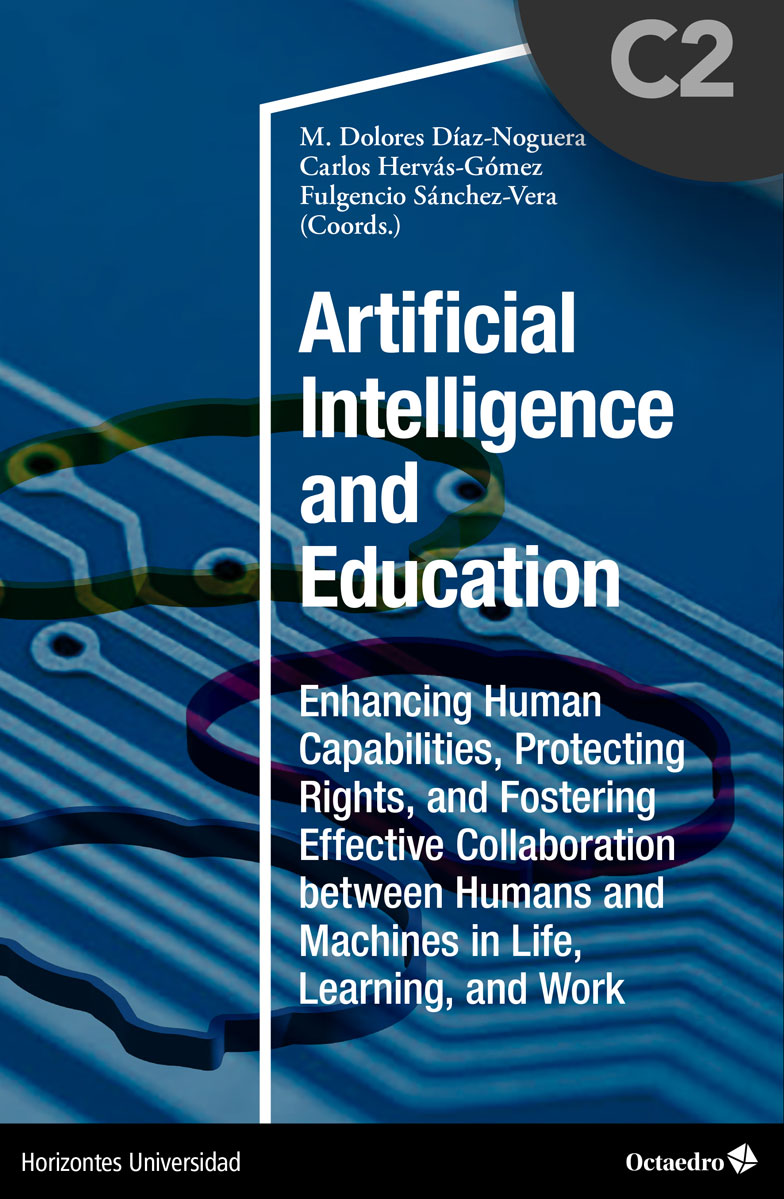FICHA TÉCNICA
Fecha de publicación:
06/11/2024
Doi del capítulo:
Título del libro: Artificial Intelligence and Education
URL del libro:
ISBN del libro: 9788410282452
DOI del libro:
Abstract
Artificial intelligence (AI) is an emerging technology that is playing a decisive role in education, transforming the way teaching and learning takes place. Personalization of learning, virtual assistance systems, task automation, skills development and content creation are some of the numerous possibilities. However, they should be supported by innovative approaches that give an active role to e-learners. The general objective of this study was to analyze the effectiveness of a teacher training program at the university level that implements AI technologies to teach social sciences content in early childhood and primary education. To this end, a quantitative method was used, specifically a descriptive pre-experimental one-group pretest-posttest design. The research was carried out with 187 students from two Spanish universities in the Bachelor’s Degree in Early Childhood and Primary Education. The training program consisted in the development and planning of 18 pedagogical situations in the field of social sciences, mediated by numerous AI tools. The results show a significant improvement in the learners’ perceptions after the training program was implemented, highlighting its usefulness in improving teaching and learning processes, particularly the creation of more effective and personalized teaching plans.
Palabras clave
Autores
PhD Alejandro López-García
Universidad de Murcia, Spain
aloga@um.es
https://orcid.org/0000-0002-7665-57890
PhD José María Campillo-Ferrer
Universidad de Murcia, Spain
jmcf2@um.es
https://orcid.org/0000-0001-8570-3749
PhD María Victoria Zaragoza-Vidal
Universidad de Murcia, Spain
mariavictoria.zaragoza@um.es
https://orcid.org/0000-0002-6175-3239
PhD Pedro Miralles-Sánchez
Universidad de Murcia, Spain
pedro.miralless@um.es
https://orcid.org/0000-0002-2436-3012
Cómo citar
López-García, A., Campillo-Ferrer, J. M., Zaragoza-Vidal, M. V., Miralles-Sánchez, P. (2024). Analysis of an Artificial Intelligence Training Program in University Students: Perspectives and Horizons. In Díaz-Noguera, M. D., Hervás-Gómez, C., Sánchez-Vera, F. (Coords.), Artificial Intelligence and Education (pp. 31-50). Octaedro. https://doi.org/10.36006/09643-1-02
Referencias bibliográficas
«Ayuso-del Puerto, D., & Gutiérrez-Esteban, P. (2022). La inteligencia artificial como recurso educativo durante la formación inicial del profesorado. RIED. Revista Iberoamericana de Educación a Distancia, 25(2), 347-358. https://doi.org/10.5944/ried.25.2.32332
Cohen, J. (1988). Statistical power analysis for the behavioral sciences (2nd edition). Lawrence Erlbaum Associates.
Hernández, R., Fernández-Collado, C., & Baptista, P. (2006). Metodología de la investigación (4rt ed.). McGraw-Hill.
Hooda, M., Rana, C., Dahiya, O., Rizwan, A., & Hossain, M. S. (2022). Artificial Intelligence for assessment and feedback to enhance student success in higher education. Mathematical Problems in Engineering, 1-19. https://doi.org/10.1155/2022/5215722
Hong, H.J. (2021). A plan to apply Artificial Intelligence ethics education into the elementary moral curriculum. Korean Elementary Moral Education Society, 75, 183-206. https://n9.cl/39wa7
Klašnja-Milićević, A., & Ivanović, M. (2021). E-learning personalization systems and sustainable education. Sustainability, 13(12), 6713. https://doi.org/10.3390/su13126713
Lee, A. (2021). The effect of Artificial Intelligence literacy education on university studens’ ethical consciousness of Artificial Intelligence. Robotics & AI Ethics, 6(3), 52-61. https://doi.org/10.22471/ai.2021. 6.3.52
Mateo, J. (2009). La investigación ex post facto. In R. Bisquerra (Coord.). Metodología de la investigación educativa (pp. 195-230). La Muralla.
McMillan, J. H., & Schumacher, S. (2005). Investigación educativa (trad. J. Sánchez) (5ª ed.). Pearson Educación.
Mir, U., Kar, A. K., & Gupta, M. P. (2022). AI-enabled digital identity-inputs for stakeholders and policymakers. Journal of Science and Technology Policy Management, 13(3), 514-541. https://doi.org/10.11 08/JSTPM-09-2020-0134
Monroy, F., & Maquilón, J. J. (2015). Correlación y regresión. In F. Hernández Pina, J. J. Maquilón, J. D. Cuesta, & T. Izquierdo (Eds.). Investigación y análisis de datos para la realización de TFG, TFM y tesis doctoral (pp. 131-156). Compobell.
Norman-Acevedo, E. (2023). La inteligencia artificial en la educación: una herramienta valiosa para los tutores virtuales universitarios y profesores universitarios. Panorama, 17(1). https://doi.org/10.157 65/pnrm.v17i32.3681
Ouyang, F., Zheng, L., & Jiao, P. (2022). Artificial Intelligence in online higher education: A systematic review of empirical research from 2011 to 2020. Education and Information Technologies, 27(6), 7893-7925. https://doi.org/10.1007/s10639-022-10925-9
Rodway, P., & Schepman, A. (2023). The impact of adopting AI educational technologies on projected course satisfaction in university students. Computers and Education: Artificial Intelligence, 5, 100150. https://doi.org/10.1016/j.caeai.2023.100150
Tapalova, O., & Zhiyenbayeva, N. (2022). Artificial Intelligence in education: AIEd for personalised learning pathways. Electronic Journal of e-Learning, 20(5), 639-653. https://doi.org/10.34190/ejel.20.5. 2597
UNESCO (2023). La inteligencia artificial en la educación. https://www.unesco.org/es/digital-education/artificial-intelligence
UNESCO (2019). International Conference on Artificial Intelligence and Education, Planning Education in the AI Era: Lead the Leap. Beijing, China. https://unesdoc.unesco.org/ark:/48223/pf0000368303
Wang, R., Li, J., Shi, W., & Li, X. (2021). Application of Artificial Intelligence techniques in operating mode of professors’ academic governance in American research universities. Hindawi. Wirelesss Communications and Mobile Computing, 1-7. https://doi.org/10.1155/20 21/3415125
Wang, S., Wang, H., Jiang, Y., Li, P., & Yang, W. (2023). Understanding students’ participation of intelligent teaching: an empirical study considering artificial intelligence usefulness, interactive reward, satisfaction, university support and enjoyment. Interactive Learning Environments, 31(9), 5633-5649. https://doi.org/10.1080/10494820.2021.2012813
Wild, S., & Schulze, L. (2021). Re-evaluation of the D21-digital-index assessment instrument for measuring higher-level digital competences. Studies in Educational Evaluation, 68(1), 100981. https://doi.org/10.1016/j.stueduc.2021.100981
Xiao, M., & Yi, H. B. (2020). Building an efficient artificial intelligence model for personalized training in colleges and universities. Computer application in Engineering Education, 29(2), 350-358. https://doi.org/10.1002/cae.22235»
